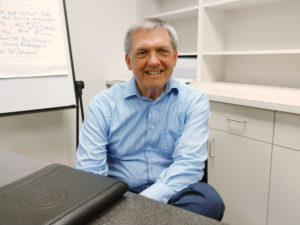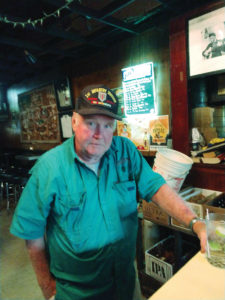Re-entering society
7/3/2019Overwhelming majority of ex-cons struggle in their return, but second chances go a long way in easing the integration.
 Literature, Hollywood, sports, music and politics have given the lie to the
Literature, Hollywood, sports, music and politics have given the lie to the
reality of ex-convicts returning to the general workplace. The romantic images
created by the examples of a few success stories do not reflect the stacked odds
against the majority. Yet that’s there because Boethius wrote “The Consolation
of Philosophy” while imprisoned. Marco Polo finished his “Travels” there.
Dante gave the world his “Divine Comedy” after imprisonment and exile.
Cervantes took inspiration for much of “Don Quixote” from his imprisonment
and enslavement on a galley. John Bunyan wrote “Pilgrim’s Progress” in jail.
Hitler wrote “Mein Kampf” in prison. Napoleon created his memoirs in exile on St. Helena’s. Oscar Wilde completed his “De Profundis” in Reading Gaol. Dostoevsky created “House of the Dead” in a Siberian labor camp. Sir Walter Raleigh gave us his “History of the World” in the Tower of London. O Henry wrote 14 stories in prison. The Marquis de Sade created his huge body of works in The Bastille. Jean Genet wrote “Our Lady of the Flowers” in a Paris prison. EE Cummings created his autobiographical novel “The Enormous Room” in French prison in World War I.
Rap, country and blues treat ex-con status like a badge of honor. Little Wayne, Gucci Mane, Cassidy, Snoop Dog, Tupac, Fat Joe, Chief Keef, Little Kim, Meek Mill, T.I. and Bobby Schmunda headline rap’s ex-cons. Johnny Cash, Merle Haggard, Hank Williams, Hank Williams, Jr., Kid Rock, Johnny Paycheck, Merle
Travis, Willie Nelson, George Jones and Glen Campbell are a few of the country stars with famous mug shots. Leadbelly, Son House and Jerry Lee Lewis star on the blues ex-con list.
Perhaps the most romantic of all ex-cons was partly truth and partly fiction. Victor Hugo’s Jean Valjean of “Les Miserable” renown was based on Eugene Francois
Vidocq, an ex-con who became a famous businessman and philanthropist. Vidocq helped Hugo with the book.
Celebrity today romanticizes the ex-con who makes good. Ex-cons in sports include Mike Tyson, Michael Vick, Tanya Harding and Plaxico Burress. Martha Stewart barely lost a step while rocking orange. Robert Downey, Jr. has been more successful since his incarceration than before it. Nelson Mandela was
named the most respected man in the world after his return from exile.

Pat Steele is the director of Central Iowa Works
and helps ex-cons with getting a driver’s license,
transportation issues and health care.
The overwhelming majority of the formerly incarcerated find no romance, just struggle, in their return. There are, however, a lot of individuals who believe in second chances and go a long way to helping ease the integration into general society. Big Ed Watkins is one of those souls. Twenty years ago, my long time
partner Shirley Fong-Torres and I created a top 10 list of America’s best tailgating sites for USA Today. We named Chapel Hill, North Carolina to the list. Soon after its publication, we heard from the Raleigh, North Carolina Convention and Visitors Bureau and were invited to a game there to see the error of our thinking. (They were correct.)
In Raleigh we were taken to meet Big Ed, a huge former tobacco farmer who donned checkered shirts and bib overalls. Ed exclusively employed ex-cons in
his legendary diner, a place near the state legislature that was known for attracting lobbyists and other deal makers to power breakfasts and lunches. We asked Ed if there was a type of criminal he would not employ.
“Yes, I will not hire an embezzler, for obvious reasons. Or a bigamist; they broke a sacred oath and can’t be trusted,” he said. Shirley asked him about murderers. “I have a murderer on my cash register. Murderers are usually good folks who just got carried away emotionally. Fact is, Missy, most people who get murdered needed murdering,” he concluded.
Steve Blount is a Des Moines version of Big Ed, hiring one-third to one-half of his construction crew laborers from the ranks of formerly incarcerated. We met him recently on a work site near Jordan Creek.
“I have four ex-cons on this crew,” Blount said. “Usually it’s about one-third. The most reliable are the guys still on paper. They are motivated to keep their jobs.”
I asked him if there were types of criminals he would not hire, Big Ed’s embezzlers and bigamists.
“Well my partner Kelly has laid down the law on anyone who has been in for abusing wives or other women,” he said. “Absolutely no pedophiles. Embezzlers are OK in my business. They don’t touch our books; they work outdoors in the open. Have not had a murderer but interviewed one once, and it was like talking to a character out of a Louis L’Amour novel. He had a well-defined moral code. He was convicted as being complicit in a murder. He was not a trigger puller and don’t think he ever would be. Before release, cons go through group therapy. I have been told that child molesters will tell counselors what they think they want to hear. But outside the therapy room, they do not believe they ever did anything wrong.”
What special conditions do ex-cons create in the workplace?

Steve Blount believes in second chances. Much of his construction crew consists of laborers who have formerly been incarcerated.
“Well, you have to accept that the vocabulary is going to be different. ‘Pussy’ is a perfectly acceptable word in conversations here. Kelly came from the corporate world. I explained that was a common term in this world. Now she has become maternal with most of these guys. She is a hardworking laborer, but she’s also part den mother. We have to assess whether a new employee is sensitive to an ex-con language environment. Will they file a sexual harassment suit?”
Blount says that maybe half of his ex-con workers will return to the Big House and half never will.
“Most of my guys were in for alcohol-related offenses. Just staying away from alcohol, and old friends who would lead them astray are the biggest things. One guy has been told to stay away from Creston. Another can’t get his drivers license back until 2050. Union guys are more stable than others. They are all hard workers. I just worry about them. I have one guy who was arrested at Menards when he was 17 for shoplifting. He pulled a knife on a security guard and went in. I have hopes he is out to stay now. He has a good support system,” he advised.
What are some problems with such workers that aren’t obvious?
“The system is schizophrenic. It wants these guys to have jobs, which is good. But all the meetings with parole officers mess them up as far as being reliably available to work. A lot of employers take advantage of the need to work. Some guys in my business pay them as little as $12 an hour. Also, and this doesn’t just apply to ex-cons, guys are more reliable near the end of the month when rent is coming due. And in good weather, too,” Blount explained.
In the United Way building in Des Moines, Central Iowa Works is involved with placing ex-cons in the workplace. Director Pat Steele and Case Manager Julianna Dubin met with us to explain their mission regarding ex-cons. They are working on a multiyear Department of Labor grant to work with 200-plus laborers to apprentice in construction, restaurants and hospitality, and distribution logistics.
“We start training while they are still incarcerated. After release, we help with getting a driver’s license, other transportation issues, and health care. After release they are sent to Fort Des Moines where they will stay until they have settled their restitution issues with victims. We have a health care program there. Jobs are not a bigger issue than mental health. Just having a case manager working with them gives them hope. It’s more important psychologically than economically,” Steele explained. Blount says that guys who are still at Fort Des
Moines are reliable because they want to get out.
“Recidivism is about 37 percent in Iowa. Our goal is to reduce that to 20 percent,” said Steele. (Nationally two-thirds of the more than 650,000 ex-offenders released from U.S. prisons and jails each year will be arrested for a new crime within three years, according to the U.S. Department of Justice.)
“Biggest risks are with minorities and veterans. Poverty is the biggest factor. This is very hard on children. We are starting programs in the schools. One-time offenders are at lower risk than others. Our programs are voluntary on their side, and that means they are motivated to stay out and get jobs,” Steele said.
What industries are most likely to hire?
“Construction, restaurants and hospitality, and manufacturing. Health care is becoming more interested. The least likely is financial services,” Steele said. (Big Ed was on to something ahead of his time.)
“We found that large chains are much less likely to hire than local independent companies,” added Dubin. She also explained that ACE (Adverse Childhood Experiences) are integral to the Central Iowa Works mission.
“Incarceration of a family member is one of the eight ACEs we look for and remedy,” she said. (The others are physical, mental or sexual abuse, substance abuse in the home, family member with mental illness, divorce and domestic violence.)
The 86-year-old Iowa Restaurant Association works with Central Iowa Works to place ex-cons. CEO and President Jessica Dunker says this a main mission because the industry is growing and labor shortages are its biggest challenge. She also says that the restaurant industry offers a big chance to move up.
“You can go from a busboy to top jobs in front and back of the house quickly. We also offer a good chance to join the middle class; 32.7 percent of restaurant workers make between 45 and 75 K, which is often a definition of the middle class,” she explained.
Several years ago, I published a story here about women convicts who were “three-time losers” with the same crime (meth abuses involved each time). Four women had remarkably the same story. They got popped for using and selling. In
prison, they had nothing to buy except junk food. They put on considerable weight by the time they were released and their old clothes didn’t fit, which led to depression and meth abuse. That cycle repeated itself three times each. I was hoping to hear a different story in 2019.
One of Blount’s workers is a personable young man named Charlie Dunbar. We asked him about his long, strange trip to where he is today.
“Originally I am from Biloxi, Mississippi. My father was in the military, so we moved a lot. Biloxi, San Diego, Phoenix and then Iowa. I used to run all over the state with people I try to stay away from now. I got caught driving while my license was suspended. Drugs were involved and so was a high-speed chase. I was also charged with weapons possession with intent to distribute and with four counts of assault on police officers,” he said candidly. (Blount added that a helicopter evacuation to University of Iowa Hospital was involved.)
Dunbar is grateful for his second chance and is intent on not blowing it. He’s been with Blount more than a year now.
It’s not easy getting a job as an ex-felon. Not all that many are interested in hiring. I had a friend in Newton (Correctional Facility) who had worked for Steve, so I contacted him along with several other job applications,” Dunbar said.
Dunbar brought a good skill set to the job. He has 14 years of experience as a finish carpenter, rough framer and landscaper. Still he found few employers interested in a felon with weapons charges.
“Steve is like family. This is a family. He even sent me on an expense-paid trip to Las Vegas last winter when weather was too bad to work. I get along great with the crew. I think we all do,” he explained.
What does he consider the biggest challenges to staying out of the joint?
“Not falling back into the company of people I used to run with. I am a homebody now,” he said.
What are the biggest temptations?
“Easy money is a cursed thing. The easier it comes, the faster it goes — and you need more. When you get out, living in poverty is hard, so the temptation is around. It’s depressing to get your paycheck and notice that the government takes 26 percent for itself. Still, work is everything. I got out of Fort Des Moines in three weeks. That’s good and all because I got a good job. I am a heavy equipment operator and a foreman now,” he said, gratefully.
Resources
In 2006, Jeff Mould spent a lot of time with his probation officer and saw the problems his fellow ex-cons faced trying to find work. In 2016, he launched The MBJ Group and its flagship product, Second Chance Jobs for Felons, a website to help “returning citizens” look for jobs. Now, the website also helps former inmates find apprenticeship programs and become certified truck drivers, among other features. www.jobsforfelonshub.com/locations/jobs-for-felons-in-des-moines-iowa/. Central Iowa Works website address is www.unitedwaydm.org/ciw-home. ♦























Wow!!! Really this article made it past the Editor. This was an extremely offensive article. How blatantly sexist and demeaning to women. The guy who hired the ex cons basically said that he discriminates against women and that “pussy” is a common word and just a part of the vocabulary and that he has to hire people who are okay with that so he doesn’t get a sexual harassment lawsuit. I couldnt even believe what I was reading. It amazes me still how accepted discrimination and poor treatment of women is still tolerated. Would the article have been written if the guy said that the “N” word is part of the vocabulary and that he has to hire people who are okay with that. The article continues to be horrible when describing the woman as taking on a maternal role. Really!!! I dont know what else to even say. Was this article written in 2019?